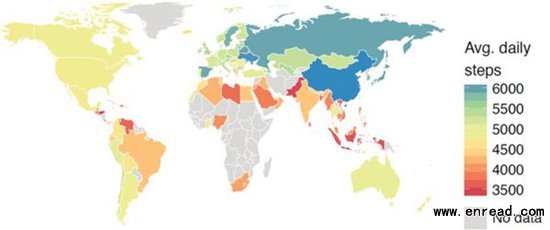| ||||||||||||||||||||||||
|
US scientists have amassed1 "planetary-scale" data from people's smartphones to see how active we really are.
美国的科学家们从人们的智能手机中收集了海量数据,用来研究人们的实际活动情况。

The Stanford University analysis of 68 million days' worth of minute-by-minute data showed the average number of daily steps was 4,961.
China was top averaging more than 6,000 a day, while Indonesia was bottom of the rankings with just 3,513.
But the findings also uncovered intriguing2 details that could help tackle obesity3.
Scott Delp, a professor of bioengineering and one of the researchers, said: "The study is 1,000 times larger than any previous study on human movement.
The findings have been published in the journal Nature and the study authors say the results give important insights for improving people's health.
The average number of steps in a country appears to be less important for obesity levels, for example.
The key ingredient was "activity inequality" - it's like wealth inequality, except instead of the difference between rich and poor, it's the difference between the fittest and laziest.
The bigger the activity inequality, the higher the rates of obesity.
点击  收听单词发音 收听单词发音
|
||||||||||||||||||||||||
上一篇:火奴鲁鲁:行人在过马路时看手机或将罚款 下一篇:蔡健雅重回环球音乐 |
||||||||||||||||||||||||
- 发表评论
-
- 最新评论 进入详细评论页>>



